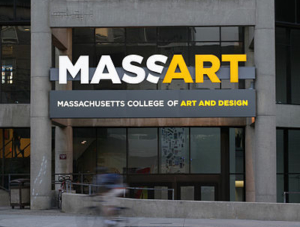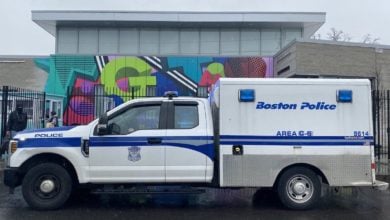
The Massachusetts College of Art and Design (MassArt) in Boston is both the last remaining four-year state college and the last remaining Colleges of the Fenway institution whose Campus Police Officers do not carry guns. Other institutions in the area have had their CPOs armed for many years: Tufts University voted to arm with semi-automatic rifles in 2008, and Northeastern University voted to do the same in 2015, despite petitions and protests from students and the local community.
MassArt students, alumni, faculty, staff, and surrounding community members have been organizing against this issue for years. In 2014, a small group of faculty and staff demanded more transparency from the administration after they hired a private consulting firm, Azdell-Morgan Organizational Management Solutions, to conduct a study that the community felt was pushing a pro-arming agenda. Another report was released in June 2016 by the Massachusetts Board of Higher Education’s Task Force on Campus Safety and Violence Prevention, reflecting on a similar report from 2008, and presenting similar conclusions. College President David Nelson was charged to create another study group, the Campus Safety Working Group, whose members collaborated with private consulting firm Margolis Healy and released a report in 2018. Among other suggestions, the report recommended that MassArt embark on a branding/marketing campaign working closely with Public Safety in order to generate more community support. The report was supposed to be released to the public in September 2017, but was not released until May 2018, and only after the Student Government Association Executive Board pressured the administration to do so.
Last fall, more than 550 people signed a petition demanding CPOs remain unarmed. Since the release of the CSWG report, Students Against Arming (SAA) decided to do their own research and presented the Board with a large binder full of information they gathered, interrupting a meeting through direct action in order to be heard. The students found that more than 65 percent of community members polled were against the arming of police, and recommended “consistent and frequent” anti-racist trainings for CPOs, faculty and staff, as well as trainings on how to respond to an active shooter on campus.
On Feb. 5, MassArt held an open Board of Trustees meeting to discuss and vote on the question. This meeting was originally scheduled for November 27, 2018 but was postponed until an unknown date in February because the Board claimed they did not have “enough information” — a move many students saw as a tactic to confuse and burn them out. Although certain members of the Board said the meeting date was posted on the school website a week before, it was not well publicized and left students questioning why they heard about it for the first time through an email sent less than 24 hours in advance. Despite the late notice, students and alumni quickly organized a call-in campaign to President Nelson and nearly 100 people attended the meeting, completely filling the room and spilling out into the crowded hallway.
MassArt CPOs and other pro-gun advocates were the first to give their testimonies, many noting the need to “protect” students, the high turnover rate of MassArt police, and how every other institution in the area is armed. According to the CSWG report, staff retention of CPOs has been a costly issue, with most resignation letters citing lack of arms as their primary concern. The absence of dissenting voices in these first testimonies was notable, and many of the speakers had prepared typed speeches; evidence that they had been notified in advance about the nature of the meeting, according to the students.
Over a dozen uniformed and plain-clothed MassArt police officers were concentrated close to the Board of Trustees near the front of the room, and several officers from surrounding institutions stood in the back, carrying their guns. Despite the intimidating police presence, the MassArt community fearlessly spoke out about the systemic nature of police brutality, mostly without script and straight from the heart. One speaker pointed to the history of police in the United States, how they originated from slave patrols and served to protect wealthy white landowners from the Indigenous people whose land they stole. Another stated that the college already is a gentrifying force in the surrounding area, and pointed out the alarming rhetoric heard earlier in the meeting when cops referred to Roxbury — a historically working class Black and Brown family neighborhood — as “dangerous”.
Camila Bohan, a junior at MassArt, noted that police officers choose their profession, but people of color do not get to choose if they are targeted. “There isn’t a need for arming, but there is a real possibility of many people getting hurt. People of color don’t get the privilege to take off their skin and walk into the world. It takes a second for racial bias to take their lives.”
“Black and Brown people are targeted by police and we all know this is fact. This is not disputable,” alum Stephanie Houten said during her testimony. “And we’re gonna sit here and act like our cops are special and different? All cops, all cops are guilty of this bias.” A police officer who had already spoken earlier in the meeting interrupted her testimony, shouting “Did you not just hear me?” before his voice was drowned out by protests and boos from the crowd. The cop — unable to control his emotions — stormed from the room and did not return to the meeting.
The board attempted to cut Houten’s testimony short by calling a five-minute break, but were again shouted down by the crowd. Chilling echoes of “What if he had a gun?” ricocheted across the room. Students continued to take the floor and demanded that their voices be heard and respected. Only 30 minutes were allotted for public participation on the agenda, but testimonies lasted well over an hour and a half. The Board of Trustees voted eight to two in favor of keeping the current policy to not arm the Campus Police.
This victory was not won spontaneously, but through an intense and emotional struggle waged over the course of many years. This will likely not be the last time the question of arming CPOs is raised at MassArt, but this meeting and its outcome are sure to set a strong precedent of community resistance against police brutality and terror in the future.






